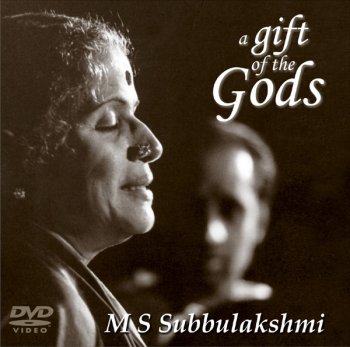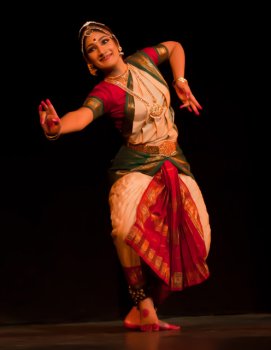
|   |

|   |
Dharini Mathurís enjoyable Bharatanatyam recital - Dr. Sunil Kothari e-mail: sunilkothari1933@gmail.com March 21, 2013 On Womenís Day on 8th March, Dharini Mathur, a senior disciple of Kanaka Srinivasan, presented an enjoyable recital at Delhi Tamil Sangam, paying tribute to M.S. Subbulakshmi. I saw Dharini last year at the Habitat Centre for the first time and was impressed by her command over technique. I also came to learn that having completed her studies in Law in Oxford University and Harvard School of Law in USA, she gave up a lucrative career after few years and returned to Bharatanatyam resuming her studies under her guru Kanaka. She also started teaching at Kanakaís institute Nrithyaranjani. Her involvement with Bharatanatyam has been for past three decades and one can see the maturity achieved by her under her guruís vigilant eye and care. It is also creditable that continuing her job now at World Bank Group in New Delhi, Dharini manages these activities with diligence. The Vazhuvoor bani, style of Guru B Vazhuvoor Ramaiah Pillaiís Bharatanatyam were popularized by Kamala. Among his innumerable students, Kanaka stood out for her fidelity to the Vazhuvoor bani. And she has trained, in turn, a number of students. Under her guidance, Dharini has successfully maintained the tradition. This is the birth centenary year of Ramaiah Pillai and it was in the fitness of things that Dharini brought to fore, the Vazhuvoor bani in a compact program, also paying tribute to MS whom Sarojini Naidu described as nightingale of India.  Prior to the performance, a brief audio visual prepared by Avinash Pasricha was screened. Despite some glitches, the DVD is an excellent one and the Delhi Tamil Sangam Auditorium resounded with MSís songs which continue to enchant us. Avinash has captured MS in various moods. His portrait of MS is one of the finest that he has ever taken of any musician. The spiritual glow on MSís face has been captured for ever. There are clips of film ĎMeeraí in which MS sang Meera bhajans soulfully. It was a trip down memory lane and set the tone for the evening. After traditional Pushpanjali in ragam Hamsanadam set to adi talam, Dharini performed to the invocation Maitrim Bhajata set to Ragamalika, adi talam, a prayer for universal brotherhood and peace, specially written by the Paramacharya of Kanchi for MSís concert before the UN General Assembly in 1966. ďThis message, no doubt, is today even more relevant when all kinds of inequities and issues divide humanity,Ē said the compere. Dharini shone in her presentation of Daru Varnam of Harikesanallur Muthiah Bhagavathar, a renowned scholar and musician. This Varnam was made popular by MS. Also it is said that when King Krishna Rajendra Wodeyar was suffering a long illness, the Bhagavathar sang this song before Goddess Chamundeswari and miraculously the king was cured of his illness. Set to Khamas and adi talam and choreographed by Kanaka, it offered Dharini ample scope to display her command over nritta and abhinaya. The dancer spread her arms diagonally, moving gracefully with exquisite utplavanas, jumps, and the backward movements with alapadma hasta stretched on either side, with graceful feet movement at once established the Vazhuvoor bani. Also dancing from the right side of the stage and moving in S shape, was also noteworthy. The devotee in the Varnam seeks the grace of the divine mother who manifests herself as Meenakshi, the Pandyan Queen of Madurai and as Chamundeswari, the family deity of the Wodeyars, the rulers of Mysore. Dharini enacted the birth of Meenakshi from the sacrificial fire, her growing up as a warrior princess, expert in all arts. There was an interesting sanchari, that when Kamadeva shot his flowery arrow on Lord Shiva, he opened his eyes and saw the Goddess in form of Parvati and married her. With his opening of the third eye, Kamadeva was reduced to ashes. The Goddess is praised as the consort of Shankar. The sanchari was enacted with brevity and suggestively by Dharini. As Chamundeswari, she slays demon Mahishasura. Dharini impersonated both the roles, as ferocious angry Chamundeswarui and the demon who is vanquished by the Goddess. The text refers to King Krishna Rajendra also who was blessed by the Goddess, as mentioned earlier.  Dharini Mathur
Dharini then moved on to the Annamacharya composition Bhavayami Gopalabalam set to Yaman Kalyan raga rendered melodiously by vocalist Ritu Vinod (who substituted as Sudha Raghurman was unwell), evoking vatsalya bhava. The unsteady baby steps taken by Lord Krishna looking like beautiful dance was presented charmingly. The reference to Ďkara navanitamí, child Krishna holding a ball of butter in his hand being worshipped by Brahma and other gods described the supremacy of the Lord. Dharini displayed child like expressions of Krishna and motherís love effectively. For her daughter Radha and Kalkiís daughter Anandhi, MS had sung the padam Malai Pozhuthinile in which Lord Muruga and the maiden in love with him are portrayed beautifully. The maiden dreams of Muruga and is overcome by shyness and asks who he is. He replies that he is nephew of Lord Krishna and she and he were united in past births. He reaches out to hold her hand and before she can overcome her hesitation to clasp his hand, the dream is over. She laments not reciprocating Lord Murugaís advances to her. The nayika wishes that she could fall asleep and dream once again. Dharini alternately enacting role of Lord Muruga and bashful nayika, registered the bhavas in a telling manner. It won her rounds of applause for Kalki Krishnamurthy's composition in Ragamalika set to adi tala. I had not seen the next padam Kurai Ondrum Illai penned by none else but C. Rajgopalachari, our first Governor General of Independent India. It was sung by MS at UN General Assembly. The gist of the song is that even when God is invisible, his unseen presence is felt and the devotee says behind screen of ignorance only wise can see him, the devotee has no regrets. The poet says that in this Kaliyuga, Lord is ever present. I have no complaints. With economical movements and suggestive abhinaya, Dharini rendered it well, conveying the concept of the poet. The finale tillana with Meera bhajan Pag ghunghroo bandh Meera nachi re saw the audience humming the melodious song along with the vocalist. Dharini was in her element dancing joyously, projecting Meeraís devotion with total surrender. The accompanists who assisted Dharini for the recital were nattuvangam by Kanaka Srinivasan, vocal by Ritu Vinod, mridangam by Keshavan and flute by Raghuraman. At the end of the recital, renowned scholar, connoisseur and former Secretary, Dept of Culture, Govt. of India, Mr. Varadrajan, was requested to give comments. He complimented Kanaka and Dharini for such a wonderful tribute to MS. He recalled several incidents of MS singing for charity. He said that since Sadashivam was always asking MS to donate the cheques received for her recitals, in one sabha, he was told that his name should be Ďsada givamí not ĎSadashivamí! He spoke eloquently about MSís greatness and simplicity, her visits to Nehru Centre in London when he was there and also to Lucknow. Quoting in Sanskrit, he regaled the audience with his speech befitting the occasion. Delhi Tamil Sangamís officials honoured the artistes. Renowned scholar and former Member of Rajya Sabha, Dr. Kapila Vatsyayan, also graced the occasion. It was a highly enjoyable evening on Womenís Day in the Capital.  Dr.
Sunil Kothari is a dance historian, scholar, author and a renowned
dance critic. He is Vice President of World Dance Alliance Asia Pacific
India chapter, based in New Delhi. He is honored by the President of
India with Padma Shri, Sangeet Natak Akademi award and Senior Critic
Award from Dance Critics Association, NYC. He is a regular contributor
to www.narthaki.com, the roving critic for monthly magazine Sruti and is
a contributing editor of Nartanam for the past 12 years. Dr.
Sunil Kothari is a dance historian, scholar, author and a renowned
dance critic. He is Vice President of World Dance Alliance Asia Pacific
India chapter, based in New Delhi. He is honored by the President of
India with Padma Shri, Sangeet Natak Akademi award and Senior Critic
Award from Dance Critics Association, NYC. He is a regular contributor
to www.narthaki.com, the roving critic for monthly magazine Sruti and is
a contributing editor of Nartanam for the past 12 years. |